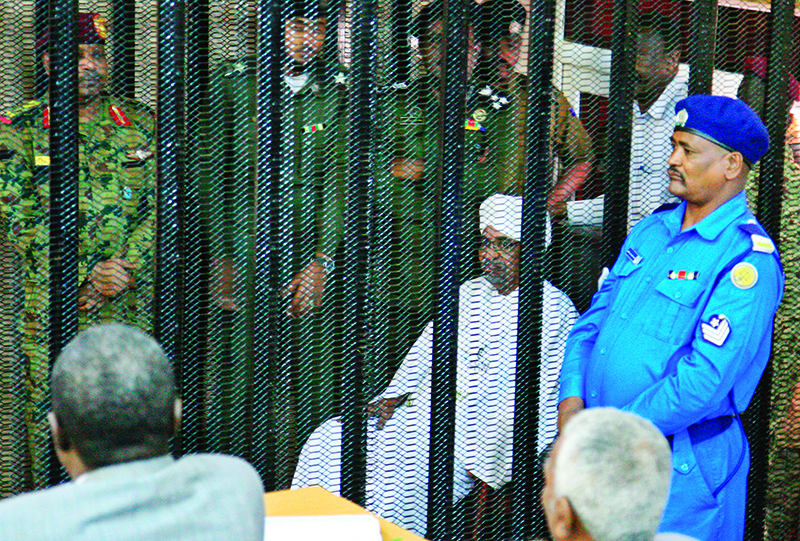
KHARTOUM: Sudan's
ousted president Omar Hassan Al-Bashir acknowledged receiving millions of
dollars, a police detective told a court yesterday at the start of a corruption
trial that many Sudanese thought they would never see. Bashir listened to the
testimony without comment, sitting in a metal cage and wearing traditional
white robes and a turban in his first appearance in a Khartoum courtroom. He is
charged with illicit possession of foreign currency and accepting gifts in an
unofficial manner. Bashir's lawyer dismissed the accusations, telling reporters
after the hearing it was usual for leaders to hold amounts of foreign currency.
The veteran
leader spoke to confirm his name and age. When asked about his residence,
Bashir laughed and said: "Formerly the airport district, at army
headquarters but now Kobar prison," referring to the detention complex
where he sent thousands of opponents during his rule. Bashir weathered multiple
rebellions, economic crises, US sanctions and coup attempts until he was
overthrown by the military in April after mass protests against his 30-year
rule.
His trial will be
seen as a test of how serious authorities are about trying to erase the legacy
of a rule marked by widespread violence, wars, economic collapse and the
secession of South Sudan. The 75-year-old, who seized power in a coup in 1989,
arrived at the courthouse in a convoy with military and paramilitary Rapid
Support Forces soldiers. Family members shouted "Allahu Akbar" (God
is the Greatest) and he raised his hand in greeting from the courtroom cage. A
small number of family members were permitted inside the cage after the session
ended to speak with him. The next hearing was scheduled for Saturday.
Bashir faces a
raft of charges of war crimes, crimes against humanity and genocide from the
International Criminal Court over his role in the Darfur war but yesterday's
trial is over graft allegations. London-based rights watchdog Amnesty
International has warned however that the corruption trial should not distract
from his Darfur indictments.
"While this
trial is a positive step towards accountability for some of his alleged crimes,
he remains wanted for heinous crimes committed against the Sudanese
people," Amnesty said. Amnesty urged the country's new transitional
institutions to ratify the ICC's Rome Statute, a move that would allow for his
transfer to the international tribunal. The Hague-based ICC has for years
demanded that Bashir stand trial, and has renewed its call since his fall.
Bashir's lawyer
Ahmed Ibrahim told reporters: "There is no information or evidence with
regards to the accusations of illicit gains aimed at Bashir. Anyone in his
occupation has to have foreign currency and it was in a room attached to his
office in his presidential residence."
Bashir was also
charged in May with incitement and involvement in the killing of protesters,
and prosecutors also want him questioned over suspected money laundering and
terrorism financing. On Saturday, Sudan's ruling military council, which took
over after Bashir's ouster, signed a power-sharing agreement with the main
opposition coalition, paving the way for a transitional government and eventual
elections. The pact sets up a sovereign council as the highest authority in the
country, but largely delegates executive powers to the cabinet of ministers.
The sovereign
council was due to be sworn in yesterday, but it was delayed after one of the
five nominees put forward by the opposition alliance representing protest
leaders turned down the job. The spokesman for the Transitional Military
Council, Lieutenant General Shams El Din Kabbashi, said the formation of the
new ruling body would be delayed by 48 hours on the request of the opposition
coalition. - Agencies










